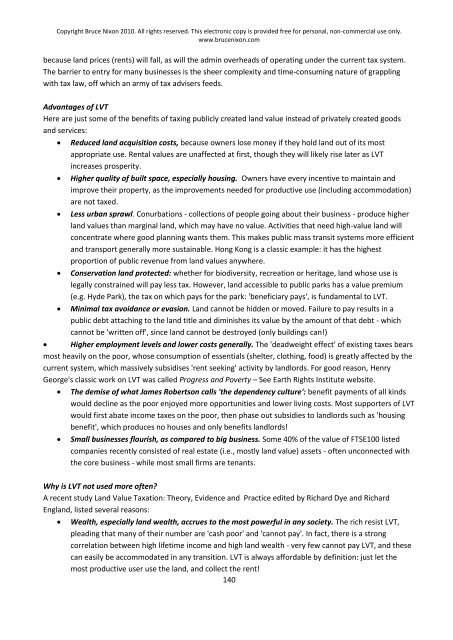A better world is possible - Global Commons Institute
A better world is possible - Global Commons Institute
A better world is possible - Global Commons Institute
You also want an ePaper? Increase the reach of your titles
YUMPU automatically turns print PDFs into web optimized ePapers that Google loves.
Copyright Bruce Nixon 2010. All rights reserved. Th<strong>is</strong> electronic copy <strong>is</strong> provided free for personal, non-commercial use only.<br />
www.brucenixon.com<br />
because land prices (rents) will fall, as will the admin overheads of operating under the current tax system.<br />
The barrier to entry for many businesses <strong>is</strong> the sheer complexity and time-consuming nature of grappling<br />
with tax law, off which an army of tax adv<strong>is</strong>ers feeds.<br />
Advantages of LVT<br />
Here are just some of the benefits of taxing publicly created land value instead of privately created goods<br />
and services:<br />
<br />
<br />
<br />
<br />
<br />
Reduced land acqu<strong>is</strong>ition costs, because owners lose money if they hold land out of its most<br />
appropriate use. Rental values are unaffected at first, though they will likely r<strong>is</strong>e later as LVT<br />
increases prosperity.<br />
Higher quality of built space, especially housing. Owners have every incentive to maintain and<br />
improve their property, as the improvements needed for productive use (including accommodation)<br />
are not taxed.<br />
Less urban sprawl. Conurbations - collections of people going about their business - produce higher<br />
land values than marginal land, which may have no value. Activities that need high-value land will<br />
concentrate where good planning wants them. Th<strong>is</strong> makes public mass transit systems more efficient<br />
and transport generally more sustainable. Hong Kong <strong>is</strong> a classic example: it has the highest<br />
proportion of public revenue from land values anywhere.<br />
Conservation land protected: whether for biodiversity, recreation or heritage, land whose use <strong>is</strong><br />
legally constrained will pay less tax. However, land accessible to public parks has a value premium<br />
(e.g. Hyde Park), the tax on which pays for the park: 'beneficiary pays', <strong>is</strong> fundamental to LVT.<br />
Minimal tax avoidance or evasion. Land cannot be hidden or moved. Failure to pay results in a<br />
public debt attaching to the land title and dimin<strong>is</strong>hes its value by the amount of that debt - which<br />
cannot be 'written off', since land cannot be destroyed (only buildings can!)<br />
Higher employment levels and lower costs generally. The 'deadweight effect' of ex<strong>is</strong>ting taxes bears<br />
most heavily on the poor, whose consumption of essentials (shelter, clothing, food) <strong>is</strong> greatly affected by the<br />
current system, which massively subsid<strong>is</strong>es 'rent seeking' activity by landlords. For good reason, Henry<br />
George's classic work on LVT was called Progress and Poverty – See Earth Rights <strong>Institute</strong> website.<br />
<br />
<br />
The dem<strong>is</strong>e of what James Robertson calls 'the dependency culture': benefit payments of all kinds<br />
would decline as the poor enjoyed more opportunities and lower living costs. Most supporters of LVT<br />
would first abate income taxes on the poor, then phase out subsidies to landlords such as 'housing<br />
benefit', which produces no houses and only benefits landlords!<br />
Small businesses flour<strong>is</strong>h, as compared to big business. Some 40% of the value of FTSE100 l<strong>is</strong>ted<br />
companies recently cons<strong>is</strong>ted of real estate (i.e., mostly land value) assets - often unconnected with<br />
the core business - while most small firms are tenants.<br />
Why <strong>is</strong> LVT not used more often?<br />
A recent study Land Value Taxation: Theory, Evidence and Practice edited by Richard Dye and Richard<br />
England, l<strong>is</strong>ted several reasons:<br />
<br />
Wealth, especially land wealth, accrues to the most powerful in any society. The rich res<strong>is</strong>t LVT,<br />
pleading that many of their number are 'cash poor' and 'cannot pay'. In fact, there <strong>is</strong> a strong<br />
correlation between high lifetime income and high land wealth - very few cannot pay LVT, and these<br />
can easily be accommodated in any transition. LVT <strong>is</strong> always affordable by definition: just let the<br />
most productive user use the land, and collect the rent!<br />
140
















